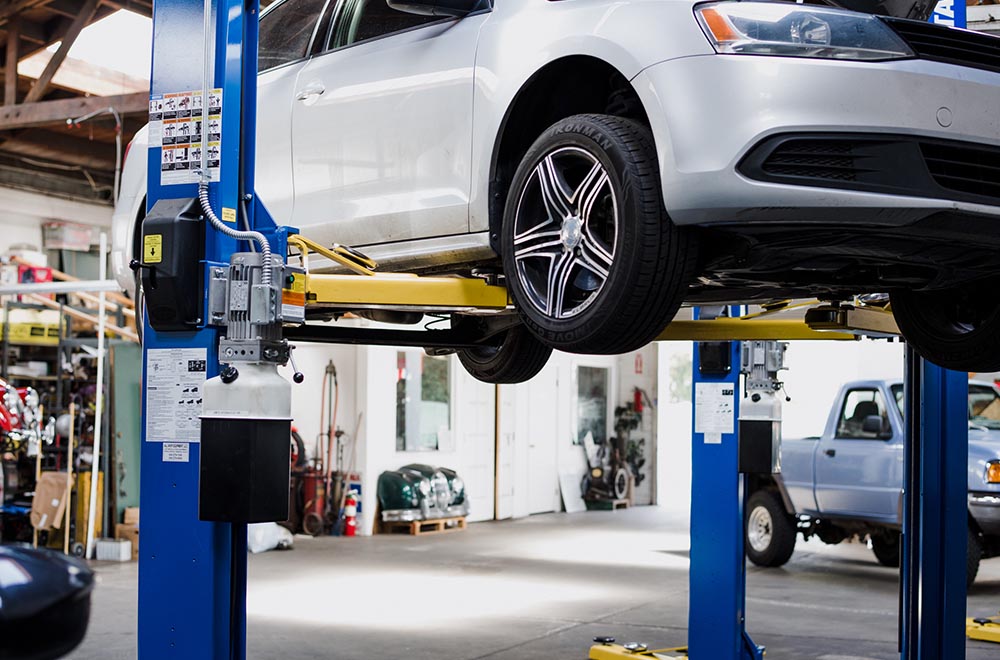Skip to content
Auto Repair Services
- Oil change: An oil change is one of the most important maintenance services for your vehicle. During this service, the mechanic will drain the old oil from the engine and replace it with fresh oil. They will also replace the oil filter and check the air filter, belts, and hoses. Regular oil changes help to keep the engine lubricated, reduce friction and wear, and prevent overheating.
- Brake service: Properly functioning brakes are essential for safe driving. Brake service can include inspecting the brake pads, rotors, and calipers for wear and damage, checking the brake fluid level, and adjusting the brakes as necessary. If your brakes are making unusual noises, vibrating, or taking longer to stop, it’s important to get them checked by a mechanic.
- Engine tune-up: An engine tune-up is a comprehensive maintenance service that can improve your vehicle’s performance, fuel efficiency, and emissions. It may involve replacing spark plugs, wires, and distributor caps, as well as cleaning or replacing the air and fuel filters. A tune-up can also help to identify and fix issues with the engine that may be causing poor performance or fuel economy.
- Transmission service: Your vehicle’s transmission is responsible for shifting gears and transferring power from the engine to the wheels. Transmission service involves draining and replacing the transmission fluid, replacing the filter, and inspecting the transmission for wear and damage. Regular transmission service can help to prevent transmission failure and prolong the life of your vehicle.
- Suspension repair: The suspension system is responsible for supporting the weight of your vehicle and providing a smooth ride. Suspension repair can include replacing shocks, struts, springs, or other components to improve ride comfort and handling. Signs that your suspension may need repair include a bouncy or unstable ride, excessive tire wear, or a clunking or knocking sound when driving over bumps.
- Electrical system diagnostics and repair: Your vehicle’s electrical system is responsible for powering everything from the headlights to the radio. Electrical system diagnostics and repair involves identifying and fixing issues with the battery, alternator, starter, or other components that can cause problems such as dim lights, a weak or dead battery, or difficulty starting the engine.
- AC system repair and recharge: Your vehicle’s air conditioning system is responsible for keeping you cool and comfortable on hot days. AC system repair involves finding and fixing leaks, replacing components such as compressors or condensers, and refilling the refrigerant to ensure that your AC is functioning properly.
- Wheel alignment: Proper wheel alignment is essential for safe and efficient driving. Wheel alignment involves adjusting the angles of the wheels to ensure that they are parallel and perpendicular to the ground. Proper wheel alignment can improve handling, reduce tire wear, and improve fuel efficiency.
- Tire replacement and balancing: Your vehicle’s tires are essential for safe and efficient driving. Tire replacement involves replacing worn or damaged tires, while tire balancing involves ensuring that the weight distribution of the tire and wheel assembly is even. Proper tire balancing can improve ride comfort and handling and reduce tire wear.
- Exhaust system repair: Your vehicle’s exhaust system is responsible for reducing harmful emissions and noise. Exhaust system repair involves replacing components such as mufflers, catalytic converters, or pipes to ensure that your vehicle’s emissions are within legal limits and that the exhaust system is functioning properly.
- Cooling system service: Your vehicle’s cooling system is responsible for keeping the engine from overheating. Cooling system service can involve flushing and refilling the coolant, replacing the radiator or other components, and checking for leaks or damage. Proper cooling system maintenance can prevent overheating and damage to your engine.
- Fuel system cleaning and repair: Your vehicle’s fuel system is responsible for delivering fuel to the engine. Over time, deposits can build up in the fuel system, which can reduce fuel efficiency and performance. Fuel system cleaning and repair can involve cleaning the fuel injectors, throttle body, and intake valves, as well as replacing the fuel filter or other components as needed.
- Battery replacement and service: Your vehicle’s battery is responsible for starting the engine and powering electrical components when the engine is not running. Battery replacement and service can involve checking the battery for signs of wear or damage, testing the charging system, and replacing the battery if necessary. Regular battery service can help to prevent unexpected battery failure and keep your vehicle running smoothly.
- Ignition system service: The ignition system is responsible for starting the engine and providing power to the spark plugs. Ignition system service can involve replacing the spark plugs, ignition wires, and distributor caps, as well as checking the ignition timing and other components. Proper ignition system maintenance can improve engine performance and fuel efficiency.
- Timing belt replacement: The timing belt is responsible for synchronizing the movement of the engine’s valves and pistons. If the timing belt breaks or becomes worn, it can cause serious engine damage. Timing belt replacement involves replacing the timing belt at regular intervals to prevent failure and ensure that the engine is running smoothly.
- Power steering service: Your vehicle’s power steering system is responsible for making it easier to steer the vehicle. Power steering service can involve flushing and refilling the power steering fluid, replacing the power steering pump or other components, and checking for leaks or damage. Proper power steering maintenance can prevent steering problems and keep you safe on the road.
- Differential service: The differential is responsible for transferring power from the engine to the wheels. Differential service involves draining and replacing the differential fluid, as well as inspecting the differential for wear and damage. Regular differential service can prolong the life of your vehicle and prevent costly repairs.
- Catalytic converter replacement: The catalytic converter is responsible for reducing harmful emissions from your vehicle. If the catalytic converter becomes clogged or damaged, it can reduce fuel efficiency and cause the vehicle to fail emissions tests. Catalytic converter replacement involves replacing the catalytic converter to ensure that your vehicle’s emissions are within legal limits.
- Fuel injection service: Fuel injection service can involve cleaning the fuel injectors and throttle body, as well as checking for leaks or damage. Proper fuel injection service can improve fuel efficiency and performance, as well as prevent engine damage.
Each of these services is important for the proper functioning of your vehicle. By staying up to date with regular maintenance and repairs, you can help to prevent unexpected breakdowns, improve fuel efficiency and performance, and prolong the life of your vehicle. At Samson Automotive, our experienced mechanics are dedicated to providing high-quality, reliable service to keep you safe and on the road.


